Travel Through Somalia (Somaliland) on a Harley-Davidson
By Peter & Kay Forwood
Somalia on a Harley (28/2/06 - 9/3/06)
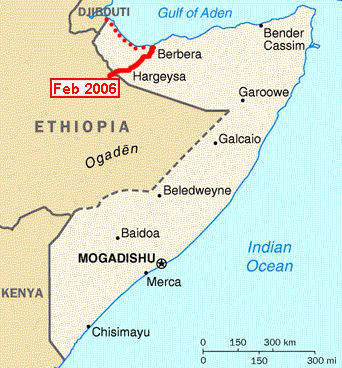
Distance 256 km (451672 km to 451928 km)
This is part of the twelfth section of our around the
world trip.
Complete Trip Overview & Map
Coming from Ethiopia
28/2/06 Somaliland officials also efficient. Customs was
at lunch so after immigration the officers simply indicated we needn't wait.
The next 20 km's also dirt and the last 70 good asphalt into Hergeysa, Somaliland's
capital. Somaliland is a country within a country, Somalia, at present. After
the fall of the central government in 1991 it formed its own government and
later voted for complete independence. This has not been recognised by the
international community which still considers Somalia a UN member despite
it not having a central government since 1991. It is fair to say that Somaliland
doesn't receive many tourists. Hergeysa was heavily destroyed in the civil
war in the late 80's when most of it's population died or fled. At 1300
metres it is a cool, dusty city of concrete architecture without the advantage
of any obvious planning. We were welcomed by it's residents. Guided to a
cheap hotel, interviewed by three of the countries newspaper reporters,
shown around town by locals, all spontaneous on our arrival.
1/3/06 Money can be changed at almost any shop.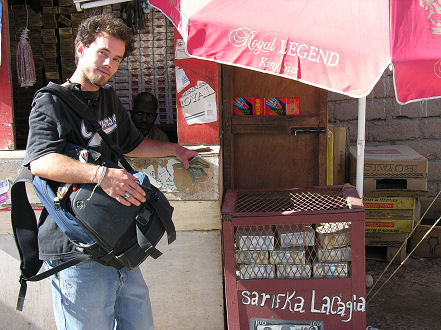 A US dollar gets about 6300 Somaliland shillings but with the largest
note, 500 shillings, or eight US cents (hardly worth the cost of counterfeiting),
changing one 100 dollar bill will give at least a wad of 1260 local notes.
The smallest note is less than a cent in value. The newspaper articles came
out this morning and we were front page on all three, and with little else
happening in the small city we were recognized everywhere we went by mid
afternoon. Most reaction was positive, people saying hello using our names
but one small child, encouraged by her mother, threw a stone that hit Kay.
There was no chastisement by any other members of the community that saw
the incident and when I complained we were simply moved along. Unfortunately
we are finding this small element more and more in the Muslim countries we
are visiting, as probably are the Muslims in the more Christian western countries.
It seems to be a part of the divide that is currently occurring around the
world. On inspection the rear shock absorber had a crack at it's base leaking
oil and could be welded closed, which we did in a local garage in the city.
We spent a lot of the day trying to find information on roads to Djibouti.
There are three, all difficult. Coast road is sandy, inland is rocky, and
the road through
A US dollar gets about 6300 Somaliland shillings but with the largest
note, 500 shillings, or eight US cents (hardly worth the cost of counterfeiting),
changing one 100 dollar bill will give at least a wad of 1260 local notes.
The smallest note is less than a cent in value. The newspaper articles came
out this morning and we were front page on all three, and with little else
happening in the small city we were recognized everywhere we went by mid
afternoon. Most reaction was positive, people saying hello using our names
but one small child, encouraged by her mother, threw a stone that hit Kay.
There was no chastisement by any other members of the community that saw
the incident and when I complained we were simply moved along. Unfortunately
we are finding this small element more and more in the Muslim countries we
are visiting, as probably are the Muslims in the more Christian western countries.
It seems to be a part of the divide that is currently occurring around the
world. On inspection the rear shock absorber had a crack at it's base leaking
oil and could be welded closed, which we did in a local garage in the city.
We spent a lot of the day trying to find information on roads to Djibouti.
There are three, all difficult. Coast road is sandy, inland is rocky, and
the road through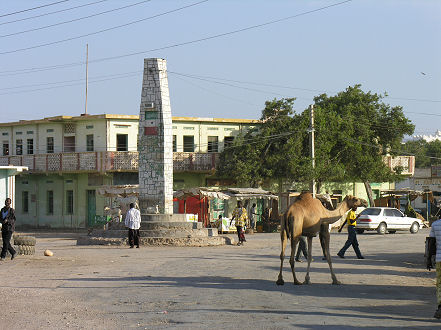 Boorama is a mixture of both, and only 4x4's and trucks are using any
of them. The local advice is to take a boat from Berbera.
Boorama is a mixture of both, and only 4x4's and trucks are using any
of them. The local advice is to take a boat from Berbera.
2/3/06 The women of Somaliland are conservatively dressed
with head scarf and flowing robes but most allow themselves to be brightly
dressed with many colours. There seems to be little activity by the men,
much time is spent chewing "khat", the mild narcotic leaf, in the afternoons.
Women are working in the tea shops and cleaning hotels. In Hergeysa english
is spoken by many people. A lot have worked overseas, leaving as refugees
to now return to help build their country. There is a feeling, and desire,
to make the country a success. People proudly talk of being more democratic
than their neighbours. They ask why Somaliland is not being recognised by
the international community as a separate country? There is nothing of specific
interest in Hergeysa that you might come to see. We just watched a city
try to function and survive, lively and friendly after too many years of
war.
3/3/06 The gradual descent ride down to the coast at Berbera
crossed a number of dry river beds on a good asphalt road. We did an oil
change under a tree along the way and were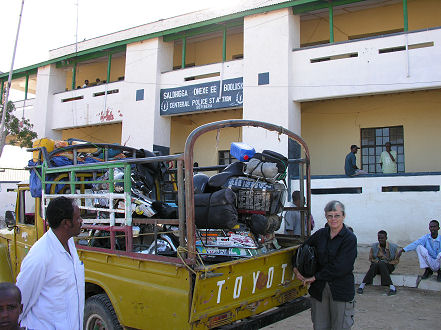 only disturbed by the passing of a couple of herds of camels being moved
along by a Somali to better grazing or water. There was little traffic being
a Friday, prayer day, and a few roadside tea places, were open for a rest.
Berbera, Somaliland's port town, is spread out along a coastal plain. There
were few boats in the port and we felt our chances of a lift to Djibouti were
slim. At a comfortable seaside restaurant, over fried fish, we negotiated
a lift for the bike and us to be carried along the sandy coastal road the
325 km/s to Djibouti in a 4x4 pickup truck, $US 250.00. The people here are
more worldly, often the influence of shipping, and more speak good English.
only disturbed by the passing of a couple of herds of camels being moved
along by a Somali to better grazing or water. There was little traffic being
a Friday, prayer day, and a few roadside tea places, were open for a rest.
Berbera, Somaliland's port town, is spread out along a coastal plain. There
were few boats in the port and we felt our chances of a lift to Djibouti were
slim. At a comfortable seaside restaurant, over fried fish, we negotiated
a lift for the bike and us to be carried along the sandy coastal road the
325 km/s to Djibouti in a 4x4 pickup truck, $US 250.00. The people here are
more worldly, often the influence of shipping, and more speak good English.
4/3/06 There is no such thing as a right or wrong decision
as the result of the alternative can never be "known". However our decision
to go by 4x4 might be considered imprudent by some. The vehicle is an old,
perhaps 1970's Toyota Land Cruiser with rusted doors and holes through the
floor. The loading was easy off a concrete wall but the police had our attention
for the next two hours, and according to locals wanted a bribe from our
driver, although we were told by the police it was a security issue as foreign
workers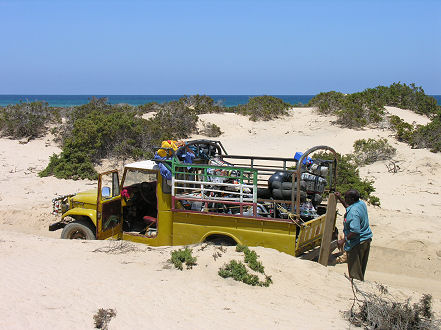 usually had an escort along that route. It was another hour for breakfast
and supplies before we departed town at 10.30 but only 10 km's out of town
at the airport we were again stopped for a police check. By 12.30 we were
bogged in sand. The owner's son, not an experienced driver, and with rock
hard tyres, getting through the sand was difficult. About 30 km from town
we stopped for an hour to tighten the rear hubs and axle and about 60 km
and 4.30 in the afternoon it was revealed the rear wheel bearings had collapsed.
We had not seen a moving vehicle on the track all day, were at a village
of two houses and a mosque with nothing to do but wait for a passing vehicle.
The owner of our vehicle speaks passable english having worked in Saudi
Arabia for eighteen years prior to losing most of his savings during the
war years afterwards. We set up the tent expecting a long wait. A couple
of trucks rolled through after dark carrying salt from evaporative pans and
took the owner's son back to Berbera to try and repair the rear hub and bearing.
We now became one of the thousands of people we have seen in our travels
sleeping roadside (or trackside) waiting for something to repair the vehicle.
We had noticed a number of wart hogs as we headed down to Berbera. Being
part of the pig family they
usually had an escort along that route. It was another hour for breakfast
and supplies before we departed town at 10.30 but only 10 km's out of town
at the airport we were again stopped for a police check. By 12.30 we were
bogged in sand. The owner's son, not an experienced driver, and with rock
hard tyres, getting through the sand was difficult. About 30 km from town
we stopped for an hour to tighten the rear hubs and axle and about 60 km
and 4.30 in the afternoon it was revealed the rear wheel bearings had collapsed.
We had not seen a moving vehicle on the track all day, were at a village
of two houses and a mosque with nothing to do but wait for a passing vehicle.
The owner of our vehicle speaks passable english having worked in Saudi
Arabia for eighteen years prior to losing most of his savings during the
war years afterwards. We set up the tent expecting a long wait. A couple
of trucks rolled through after dark carrying salt from evaporative pans and
took the owner's son back to Berbera to try and repair the rear hub and bearing.
We now became one of the thousands of people we have seen in our travels
sleeping roadside (or trackside) waiting for something to repair the vehicle.
We had noticed a number of wart hogs as we headed down to Berbera. Being
part of the pig family they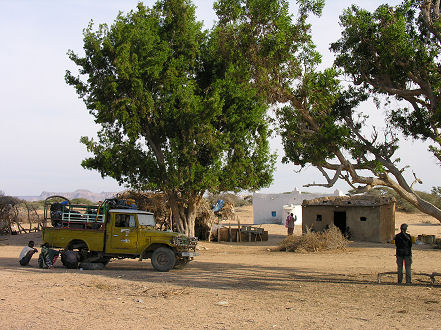 are not hunted by the Muslim population. Today we also saw many gazelles,
a couple of baboons, dik-dik (a long legged hare sized deer) and birds along
our sandy track paralleling the ocean.
are not hunted by the Muslim population. Today we also saw many gazelles,
a couple of baboons, dik-dik (a long legged hare sized deer) and birds along
our sandy track paralleling the ocean.
5/3/06 The baby camel, obviously sick in the small village
last night, was this morning being butchered. It's meat hung out on the
thorn bushes or placed in rice bags and distributed to other villagers as
they passed by with donkeys and camels to collect water from the nearby well.
A number of large camel herds also passed between our camp and the beach
heading for the days grazing. We have about a days supply of emergency food
that we carry, pasta and sardines and we had pasta, milk and sugar for breakfast
as we waited. We were surprised when the owner's son arrived at 10 am, in
his brother's 4x4, with the hub repaired, well almost repaired as the oil
seal had been damaged in the installation process. We were again on the road
by 11 am but it was only minutes before the steering was an issue. Worn ball
joints, the wheels moved side to side in the sand. We also spent more time
digging out the vehicle from the sand as trucks, being higher, had formed
a ridge too high for the 4x4. It was only mid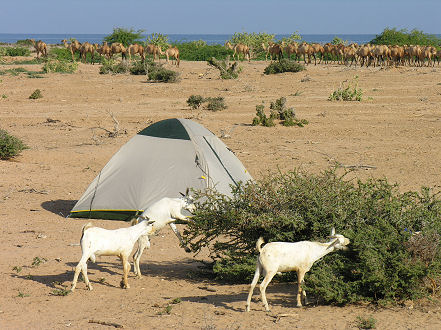 afternoon that we convinced the owner the rear tyres were over inflated
and on checking had 70 psi, and when reduced to 45, all the owner would allow,
we moved a little more easily. On dark we stopped at a small village for the
night, just 100 km's from Berbera in two days.
afternoon that we convinced the owner the rear tyres were over inflated
and on checking had 70 psi, and when reduced to 45, all the owner would allow,
we moved a little more easily. On dark we stopped at a small village for the
night, just 100 km's from Berbera in two days.
6/3/06 An early start and we were optimistic of success.
The front ball joints had been strengthened with strips of rubber tubing
and the steering was performing better. The people here carry no weapons
and hunting the wildlife doesn't seem to occur. There are many birds and
squirrels, plus the larger animals mentioned before moving about with little
fear. It turns out our driver has poor eye sight, being over 60 yrs old,
and cannot easily make out the definitions of uneven ground, and with the
truck's brakes almost non existent the bike bouncing in the back is receiving
some cosmetic damage. Bogged again and we are only moving for one hour of
the first two before another small village. Here the owner has had enough
and refuses to go on. Nothing has been his fault. It has all been the will
of God that has brought us bad luck. When I mention his lack of preparation
or planning, or not being aware of his commitment to getting us to the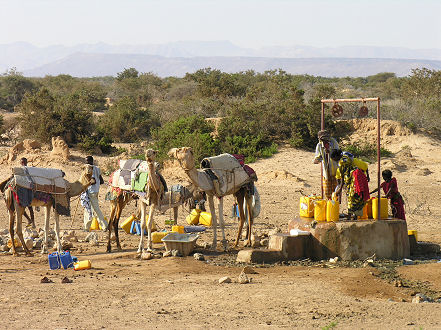 border he simply states it is God's will. We recently passed the junction
of where the road from Hergeysa joins the coast road and he decides we will
wait for vehicles along it, usually travelling at night, with the hope of
transferring the bike to one. Unfortunately this idea was not mentioned the
night before as an empty salt truck passed going our way at 2 am. We sat all
day in the shade of the five hut town as a steady stream of walkers passed
through with donkeys for water, resting up midday till the khat arrives, also
by foot, from the mountains. Putting up our tent near the road we waited having
not seen another vehicle all day. From 10 pm till just after 2 am a few 4x4,
Toyota type passenger vehicles, carrying up to a dozen people, a couple sitting
on the roof in makeshift seats, passed by. Three stopped and discussed our
situation with the driver, but their vehicles being enclosed could not take
the motorcycle, even if empty. I had done the early stay awake shift till
2 am and Kay sat up till dawn. There were no empty salt trucks tonight.
border he simply states it is God's will. We recently passed the junction
of where the road from Hergeysa joins the coast road and he decides we will
wait for vehicles along it, usually travelling at night, with the hope of
transferring the bike to one. Unfortunately this idea was not mentioned the
night before as an empty salt truck passed going our way at 2 am. We sat all
day in the shade of the five hut town as a steady stream of walkers passed
through with donkeys for water, resting up midday till the khat arrives, also
by foot, from the mountains. Putting up our tent near the road we waited having
not seen another vehicle all day. From 10 pm till just after 2 am a few 4x4,
Toyota type passenger vehicles, carrying up to a dozen people, a couple sitting
on the roof in makeshift seats, passed by. Three stopped and discussed our
situation with the driver, but their vehicles being enclosed could not take
the motorcycle, even if empty. I had done the early stay awake shift till
2 am and Kay sat up till dawn. There were no empty salt trucks tonight.
7/3/06 We stayed in the tent till it became too hot trying
to regain some sleep then moved our mattresses under a nearby tree reading
books and listening to the BBC on the satellite radio.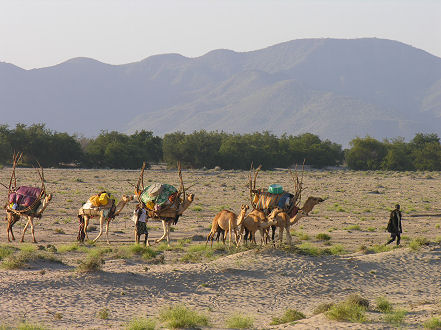 Almost all our supplies were running low. We could buy tea with camel milk
from one of the huts which also sold us rice, pasta and tomato paste, about
all they had for food variety. Camel milk seems to be the main protein food
in the area and is included in all meals or is a meal in itself. Starting
to become increasingly frustrated with our situation I finally managed to
have the driver agree to continue if no alternative vehicle came tonight.
It seems he is more scared of the road ahead rather than scamming us. Scared
of the financial loss if he breaks down again or gets stuck on the long section
ahead.
Almost all our supplies were running low. We could buy tea with camel milk
from one of the huts which also sold us rice, pasta and tomato paste, about
all they had for food variety. Camel milk seems to be the main protein food
in the area and is included in all meals or is a meal in itself. Starting
to become increasingly frustrated with our situation I finally managed to
have the driver agree to continue if no alternative vehicle came tonight.
It seems he is more scared of the road ahead rather than scamming us. Scared
of the financial loss if he breaks down again or gets stuck on the long section
ahead.
8/3/06 Again we rotated shifts of staying awake hoping
for the empty salt truck that didn't come. The small hut where we had based
ourselves sells tea and camel milk to the few 4x4's that pass each night,
if they stop. A small fire is lit to attract them and we lay near looking
at the stars as the moon slowly crossed the sky. By dawn our driver is devastated
having to continue in his vehicle but we were away by 7 am. Two hours to the
biggest settlement along the road so far, more digging out in the now powdery
dust. As the son digs the rear wheels, laying boards, we place boards for
the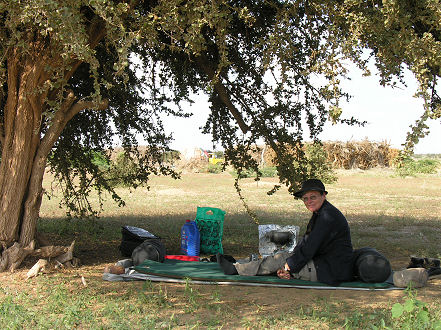 front ones, after only going a few metres before having to repeat the process.
The police hold us at the town for half an hour looking for money but we all
explain we have none left after being stuck for two days and we are let pass.
The next 70 km's is excellent, driving across a dry mud, salt pan, then to
undulating, salt hardened, dunes, throwing the bike everywhere in the back
of the truck. By lunch time the driver is finally happy as we have reached
another town where the trucks split on their different road to Hergeysa and
seemingly civilisation. Pasta and sauce, the staple food in every roadside
place here, and khat for the driver and his son, relaxed, a little too much,
and now feeling buoyed by their success we head out for the last 60 km to
the border only to run out of fuel 20 km's short after having just spent 90
minutes crossing the last riverbed digging out the vehicle. Again the driver
became devastated, at 5 pm, and no prospects of vehicles till morning going
our way. We offer the fuel from the motorcycle's tank and get to the border
town on dusk, unloading the bike onto a raised, unused toilet base. We paid
the remaining $US 150.00, only to be asked for more, even though our 13 hour
journey became a five day saga. With a local crowd watching, the bike started
on only one cylinder and rattled noisily,
front ones, after only going a few metres before having to repeat the process.
The police hold us at the town for half an hour looking for money but we all
explain we have none left after being stuck for two days and we are let pass.
The next 70 km's is excellent, driving across a dry mud, salt pan, then to
undulating, salt hardened, dunes, throwing the bike everywhere in the back
of the truck. By lunch time the driver is finally happy as we have reached
another town where the trucks split on their different road to Hergeysa and
seemingly civilisation. Pasta and sauce, the staple food in every roadside
place here, and khat for the driver and his son, relaxed, a little too much,
and now feeling buoyed by their success we head out for the last 60 km to
the border only to run out of fuel 20 km's short after having just spent 90
minutes crossing the last riverbed digging out the vehicle. Again the driver
became devastated, at 5 pm, and no prospects of vehicles till morning going
our way. We offer the fuel from the motorcycle's tank and get to the border
town on dusk, unloading the bike onto a raised, unused toilet base. We paid
the remaining $US 150.00, only to be asked for more, even though our 13 hour
journey became a five day saga. With a local crowd watching, the bike started
on only one cylinder and rattled noisily,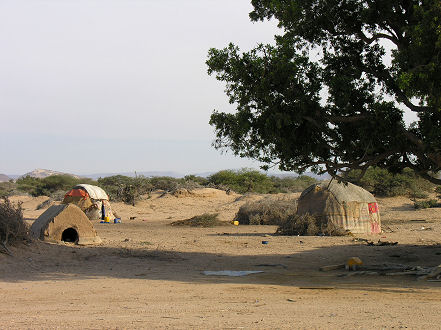 but after cleaning the plugs we rode to the border post and were allowed
to pitch the tent in their compound and await the border opening tomorrow
morning. A fairly typical border town of restaurants, merchants, and people
lost between countries, often without money or papers or trying to cross illegally.
but after cleaning the plugs we rode to the border post and were allowed
to pitch the tent in their compound and await the border opening tomorrow
morning. A fairly typical border town of restaurants, merchants, and people
lost between countries, often without money or papers or trying to cross illegally.
9/3/06 The border opened at 8 am and we left Somaliland
having had a great time. Had the difficulties of the driver and vehicle not
occurred we would not have had the opportunity to experience the people and
their remote rural lifestyle in such close detail. Often it is these unplanned
encounters that stay in our memories.
Move with us to Djibouti
 A US dollar gets about 6300 Somaliland shillings but with the largest
note, 500 shillings, or eight US cents (hardly worth the cost of counterfeiting),
changing one 100 dollar bill will give at least a wad of 1260 local notes.
The smallest note is less than a cent in value. The newspaper articles came
out this morning and we were front page on all three, and with little else
happening in the small city we were recognized everywhere we went by mid
afternoon. Most reaction was positive, people saying hello using our names
but one small child, encouraged by her mother, threw a stone that hit Kay.
There was no chastisement by any other members of the community that saw
the incident and when I complained we were simply moved along. Unfortunately
we are finding this small element more and more in the Muslim countries we
are visiting, as probably are the Muslims in the more Christian western countries.
It seems to be a part of the divide that is currently occurring around the
world. On inspection the rear shock absorber had a crack at it's base leaking
oil and could be welded closed, which we did in a local garage in the city.
We spent a lot of the day trying to find information on roads to Djibouti.
There are three, all difficult. Coast road is sandy, inland is rocky, and
the road through
A US dollar gets about 6300 Somaliland shillings but with the largest
note, 500 shillings, or eight US cents (hardly worth the cost of counterfeiting),
changing one 100 dollar bill will give at least a wad of 1260 local notes.
The smallest note is less than a cent in value. The newspaper articles came
out this morning and we were front page on all three, and with little else
happening in the small city we were recognized everywhere we went by mid
afternoon. Most reaction was positive, people saying hello using our names
but one small child, encouraged by her mother, threw a stone that hit Kay.
There was no chastisement by any other members of the community that saw
the incident and when I complained we were simply moved along. Unfortunately
we are finding this small element more and more in the Muslim countries we
are visiting, as probably are the Muslims in the more Christian western countries.
It seems to be a part of the divide that is currently occurring around the
world. On inspection the rear shock absorber had a crack at it's base leaking
oil and could be welded closed, which we did in a local garage in the city.
We spent a lot of the day trying to find information on roads to Djibouti.
There are three, all difficult. Coast road is sandy, inland is rocky, and
the road through Boorama is a mixture of both, and only 4x4's and trucks are using any
of them. The local advice is to take a boat from Berbera.
Boorama is a mixture of both, and only 4x4's and trucks are using any
of them. The local advice is to take a boat from Berbera. 
 only disturbed by the passing of a couple of herds of camels being moved
along by a Somali to better grazing or water. There was little traffic being
a Friday, prayer day, and a few roadside tea places, were open for a rest.
Berbera, Somaliland's port town, is spread out along a coastal plain. There
were few boats in the port and we felt our chances of a lift to Djibouti were
slim. At a comfortable seaside restaurant, over fried fish, we negotiated
a lift for the bike and us to be carried along the sandy coastal road the
325 km/s to Djibouti in a 4x4 pickup truck, $US 250.00. The people here are
more worldly, often the influence of shipping, and more speak good English.
only disturbed by the passing of a couple of herds of camels being moved
along by a Somali to better grazing or water. There was little traffic being
a Friday, prayer day, and a few roadside tea places, were open for a rest.
Berbera, Somaliland's port town, is spread out along a coastal plain. There
were few boats in the port and we felt our chances of a lift to Djibouti were
slim. At a comfortable seaside restaurant, over fried fish, we negotiated
a lift for the bike and us to be carried along the sandy coastal road the
325 km/s to Djibouti in a 4x4 pickup truck, $US 250.00. The people here are
more worldly, often the influence of shipping, and more speak good English. usually had an escort along that route. It was another hour for breakfast
and supplies before we departed town at 10.30 but only 10 km's out of town
at the airport we were again stopped for a police check. By 12.30 we were
bogged in sand. The owner's son, not an experienced driver, and with rock
hard tyres, getting through the sand was difficult. About 30 km from town
we stopped for an hour to tighten the rear hubs and axle and about 60 km
and 4.30 in the afternoon it was revealed the rear wheel bearings had collapsed.
We had not seen a moving vehicle on the track all day, were at a village
of two houses and a mosque with nothing to do but wait for a passing vehicle.
The owner of our vehicle speaks passable english having worked in Saudi
Arabia for eighteen years prior to losing most of his savings during the
war years afterwards. We set up the tent expecting a long wait. A couple
of trucks rolled through after dark carrying salt from evaporative pans and
took the owner's son back to Berbera to try and repair the rear hub and bearing.
We now became one of the thousands of people we have seen in our travels
sleeping roadside (or trackside) waiting for something to repair the vehicle.
We had noticed a number of wart hogs as we headed down to Berbera. Being
part of the pig family they
usually had an escort along that route. It was another hour for breakfast
and supplies before we departed town at 10.30 but only 10 km's out of town
at the airport we were again stopped for a police check. By 12.30 we were
bogged in sand. The owner's son, not an experienced driver, and with rock
hard tyres, getting through the sand was difficult. About 30 km from town
we stopped for an hour to tighten the rear hubs and axle and about 60 km
and 4.30 in the afternoon it was revealed the rear wheel bearings had collapsed.
We had not seen a moving vehicle on the track all day, were at a village
of two houses and a mosque with nothing to do but wait for a passing vehicle.
The owner of our vehicle speaks passable english having worked in Saudi
Arabia for eighteen years prior to losing most of his savings during the
war years afterwards. We set up the tent expecting a long wait. A couple
of trucks rolled through after dark carrying salt from evaporative pans and
took the owner's son back to Berbera to try and repair the rear hub and bearing.
We now became one of the thousands of people we have seen in our travels
sleeping roadside (or trackside) waiting for something to repair the vehicle.
We had noticed a number of wart hogs as we headed down to Berbera. Being
part of the pig family they are not hunted by the Muslim population. Today we also saw many gazelles,
a couple of baboons, dik-dik (a long legged hare sized deer) and birds along
our sandy track paralleling the ocean.
are not hunted by the Muslim population. Today we also saw many gazelles,
a couple of baboons, dik-dik (a long legged hare sized deer) and birds along
our sandy track paralleling the ocean. afternoon that we convinced the owner the rear tyres were over inflated
and on checking had 70 psi, and when reduced to 45, all the owner would allow,
we moved a little more easily. On dark we stopped at a small village for the
night, just 100 km's from Berbera in two days.
afternoon that we convinced the owner the rear tyres were over inflated
and on checking had 70 psi, and when reduced to 45, all the owner would allow,
we moved a little more easily. On dark we stopped at a small village for the
night, just 100 km's from Berbera in two days. border he simply states it is God's will. We recently passed the junction
of where the road from Hergeysa joins the coast road and he decides we will
wait for vehicles along it, usually travelling at night, with the hope of
transferring the bike to one. Unfortunately this idea was not mentioned the
night before as an empty salt truck passed going our way at 2 am. We sat all
day in the shade of the five hut town as a steady stream of walkers passed
through with donkeys for water, resting up midday till the khat arrives, also
by foot, from the mountains. Putting up our tent near the road we waited having
not seen another vehicle all day. From 10 pm till just after 2 am a few 4x4,
Toyota type passenger vehicles, carrying up to a dozen people, a couple sitting
on the roof in makeshift seats, passed by. Three stopped and discussed our
situation with the driver, but their vehicles being enclosed could not take
the motorcycle, even if empty. I had done the early stay awake shift till
2 am and Kay sat up till dawn. There were no empty salt trucks tonight.
border he simply states it is God's will. We recently passed the junction
of where the road from Hergeysa joins the coast road and he decides we will
wait for vehicles along it, usually travelling at night, with the hope of
transferring the bike to one. Unfortunately this idea was not mentioned the
night before as an empty salt truck passed going our way at 2 am. We sat all
day in the shade of the five hut town as a steady stream of walkers passed
through with donkeys for water, resting up midday till the khat arrives, also
by foot, from the mountains. Putting up our tent near the road we waited having
not seen another vehicle all day. From 10 pm till just after 2 am a few 4x4,
Toyota type passenger vehicles, carrying up to a dozen people, a couple sitting
on the roof in makeshift seats, passed by. Three stopped and discussed our
situation with the driver, but their vehicles being enclosed could not take
the motorcycle, even if empty. I had done the early stay awake shift till
2 am and Kay sat up till dawn. There were no empty salt trucks tonight. Almost all our supplies were running low. We could buy tea with camel milk
from one of the huts which also sold us rice, pasta and tomato paste, about
all they had for food variety. Camel milk seems to be the main protein food
in the area and is included in all meals or is a meal in itself. Starting
to become increasingly frustrated with our situation I finally managed to
have the driver agree to continue if no alternative vehicle came tonight.
It seems he is more scared of the road ahead rather than scamming us. Scared
of the financial loss if he breaks down again or gets stuck on the long section
ahead.
Almost all our supplies were running low. We could buy tea with camel milk
from one of the huts which also sold us rice, pasta and tomato paste, about
all they had for food variety. Camel milk seems to be the main protein food
in the area and is included in all meals or is a meal in itself. Starting
to become increasingly frustrated with our situation I finally managed to
have the driver agree to continue if no alternative vehicle came tonight.
It seems he is more scared of the road ahead rather than scamming us. Scared
of the financial loss if he breaks down again or gets stuck on the long section
ahead.  front ones, after only going a few metres before having to repeat the process.
The police hold us at the town for half an hour looking for money but we all
explain we have none left after being stuck for two days and we are let pass.
The next 70 km's is excellent, driving across a dry mud, salt pan, then to
undulating, salt hardened, dunes, throwing the bike everywhere in the back
of the truck. By lunch time the driver is finally happy as we have reached
another town where the trucks split on their different road to Hergeysa and
seemingly civilisation. Pasta and sauce, the staple food in every roadside
place here, and khat for the driver and his son, relaxed, a little too much,
and now feeling buoyed by their success we head out for the last 60 km to
the border only to run out of fuel 20 km's short after having just spent 90
minutes crossing the last riverbed digging out the vehicle. Again the driver
became devastated, at 5 pm, and no prospects of vehicles till morning going
our way. We offer the fuel from the motorcycle's tank and get to the border
town on dusk, unloading the bike onto a raised, unused toilet base. We paid
the remaining $US 150.00, only to be asked for more, even though our 13 hour
journey became a five day saga. With a local crowd watching, the bike started
on only one cylinder and rattled noisily,
front ones, after only going a few metres before having to repeat the process.
The police hold us at the town for half an hour looking for money but we all
explain we have none left after being stuck for two days and we are let pass.
The next 70 km's is excellent, driving across a dry mud, salt pan, then to
undulating, salt hardened, dunes, throwing the bike everywhere in the back
of the truck. By lunch time the driver is finally happy as we have reached
another town where the trucks split on their different road to Hergeysa and
seemingly civilisation. Pasta and sauce, the staple food in every roadside
place here, and khat for the driver and his son, relaxed, a little too much,
and now feeling buoyed by their success we head out for the last 60 km to
the border only to run out of fuel 20 km's short after having just spent 90
minutes crossing the last riverbed digging out the vehicle. Again the driver
became devastated, at 5 pm, and no prospects of vehicles till morning going
our way. We offer the fuel from the motorcycle's tank and get to the border
town on dusk, unloading the bike onto a raised, unused toilet base. We paid
the remaining $US 150.00, only to be asked for more, even though our 13 hour
journey became a five day saga. With a local crowd watching, the bike started
on only one cylinder and rattled noisily, but after cleaning the plugs we rode to the border post and were allowed
to pitch the tent in their compound and await the border opening tomorrow
morning. A fairly typical border town of restaurants, merchants, and people
lost between countries, often without money or papers or trying to cross illegally.
but after cleaning the plugs we rode to the border post and were allowed
to pitch the tent in their compound and await the border opening tomorrow
morning. A fairly typical border town of restaurants, merchants, and people
lost between countries, often without money or papers or trying to cross illegally.